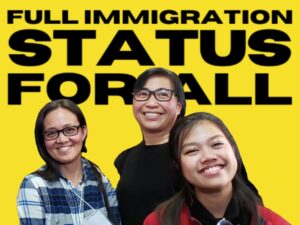LUZVIMINDA’S STORY
(Based on an interview with KAIROS)
My name is Luzviminda Alicbusan. I’m a caregiver. I came to Canada from the Philippines in 2008. After completing the 24-month live-in requirement, I submitted my permanent resident application in 2011.
In 2014, I received the Procedural Fairness Letter. In 2015, Citizenship and Immigration Canada refused my application because my son was deemed to be “medically inadmissible as he might reasonably be expected to cause excessive demands in medical and social services”. I was advised as well that I need to leave Canada before my work permit expired.
It was a devastating moment for me and my family. I am here in Canada looking after my employer’s children, cooking for them, cleaning their house and doing their laundry, paying taxes and contributing to Employment Insurance and Canada’s Pension Plan, yet I cannot be reunited with my family just because my son is believed to cause excessive demands in medical and social services.
I find this very unfair and unjust. We are brought here to care for people with disabilities, yet the Canadian law will not allow us to become permanent residents because we have a family member with a disability.
Our children with a disability are not a burden to us. They are a blessing. They are the reason why we work so hard, why we become stronger people. Yet we are being penalized for having children or other family members with a disability. We are as important as anyone here in Canada; we work hard and contribute to the Canadian economy.
I’ve been here in Canada for almost a decade. I missed so many special occasions with my family. My mom passed away in 2016 and I was not able to go home and pay my last respects because I spent all my savings paying a lawyer to appeal my case.
This is why we want all caregivers who are here in Canada to be given permanent resident status and all those coming in under the new program in November 2019 to be granted permanent residency upon arrival.
TERESA’S STORY
(Weiler, Anelyse. “Migrant Farm Workers Vulnerable to Sexual Violence.” The Conversation. May 1, 2018. Accessed May 30, 2018.)
After Teresa filed a report against her farm employer for sexual assault, he asked her how much money it would take for her to retract her statement. In the spring of 2014, Teresa (not her real name) was attacked by her boss on his farm in British Columbia.
On the day the assault occurred, the boss sent Teresa’s male co-workers to another farm for the day, leaving her and another female farm worker behind. While they were trellising grape vines, the women ran out of twine.
Teresa’s boss told her to come and get more twine inside a shed, where she says he forced his mouth onto hers and began grabbing her inappropriately. She managed to shake off his grip and run back to her co-worker in the vineyard for support.
It was her word against his, and the Crown decided there wasn’t enough evidence to proceed with the charges. In Canada, 46 per cent of women survivors don’t even report sexual assault because they think there is insufficient proof.
Teresa is a single mom from Baja California, Mexico. Since 2012, she has been supporting her parents and two daughters by spending up to eight months each year on Canadian farms through the Seasonal Agricultural Worker Program (SAWP). Teresa was concerned that speaking up about the sexual assault might hurt her and her female co-worker’s future job chances.
She says Mexico’s Secretariat of Labour and Social Welfare verbally warns SAWP workers each season before they leave Mexico: “You’re coming to Canada to work, not to cause problems. If you complain about something, they kick you out of the program.”
After the assault, Teresa was transferred to a small vegetable farm, where her new employer provided accommodations in a rodent-infested trailer without a functional lock. Teresa’s attacker lived in the adjacent village in British Columbia’s southern Interior. She suffered from recurrent nightmares. “I was afraid. I thought he was going to show up or that he was going to do something to me.”
Canada’s SAWP is the main agricultural stream of the Temporary Foreign Worker Program. It began in 1966 in response to lobbying from farmers and that year in Ontario, 264 Jamaican workers were hired. Since then, the program has expanded to all Canadian provinces, bringing workers from Mexico and 11 Caribbean countries. In 2017, approximately 40,000 workers came to Canada as a part of the SAWP — around 7,500 to British Columbia. Of those, less than four per cent were women.
The structure of the SAWP heightens the power imbalance between workers and employers, amplifying women’s vulnerability to sexual assault. Work permits are tied to a specific employer, so getting fired typically means getting deported. Workers in abusive workplaces often have difficulty transferring to a new boss. To be rehired the following season, a farm worker must receive a positive evaluation from their employer.
The SAWP requirements effectively deter worker complaints about labour practices, housing conditions, workplace injuries or violence. The SAWP contains no pathway to citizenship, even for men and women who have worked in Canada for decades.
Workers and critics of the program argue that permanently categorizing migrants as “non-citizens” means they have fewer rights and protections than Canadian workers. The SAWP has been a boon for growers, who have access to a seemingly unending pool of workers whose urgent need for income makes them unlikely to dissent.
While sexual assault in general is the most underreported violent crime in Canada, a precarious citizenship status presents an additional barrier to reporting for migrant women (both undocumented and government-authorized). Teresa said a fear of deportation was a major factor in deciding whether to report their assaults. She knew of other workers who had been sent home for complaining to authorities about living conditions, workplace injuries, bullying and harassment. Despite all the pain she has experienced in Canada, Teresa says thinking about her own daughters gives her the strength to keep going.
As part of a cultural shift toward gender equity, we need to revamp Canada’s laws, institutions and policies to better protect all women, including farm workers. The B.C. government has promised to establish a registry that could help prevent migrant workers from being charged illegal recruitment fees, which is a positive starting point. As supported by U.S. research on sexual assault services, provinces could also set up anonymous, toll-free and multilingual crisis hotlines for workers, including those who are undocumented.
To address the multiple barriers faced by migrant farm worker women to health care, researchers have recommended enrolling workers in provincial health-care plans instead of private insurance schemes. Free legal services and English-language classes could also strengthen women’s ability to assert their rights. Workers should have the right to a fair appeal process before deportation.
Ultimately, the Canadian government should eliminate tied work permits and provide migrant workers with full immigration status, two steps that would immediately lessen the disproportionate power of the employer. Such changes would also go a long way toward ensuring that those who do the vital work of growing the food we eat receive the respect, freedom and dignity they deserve.
GABRIEL’S STORY
RYAN’S STORY
(Keung, Nicholas. “Migrant Workers Sue Recruiter, Employer in Small Claims Court.” The Toronto Star. May 28, 2018. Accessed June 10, 2018.)
Ryan Aporbo was desperate when he lost his job as a restaurant cleaner amid Alberta’s economic recession and faced possible removal to his native Philippines.
Then the temporary foreign worker said he found an ad from Toronto-based A&L Hammer Workforce Management Inc., which recruits workers for nursing homes, construction, agriculture, factories, meat packing plants, hotels and restaurants.
Aporbo said he was told by the agency’s owner, Liwayway “Lily” Miranda, that a farm in East Gwillimbury was looking for mushroom pickers. For nine months, from April 2016 to January 2017, he says he worked at the Sharon Mushroom Farm on a visitor visa instead of a work permit.
He is now among a group of Filipino workers suing Miranda, A&L Hammer and Sharon Mushroom Farm in small claims court, alleging they were improperly charged thousands of dollars in fees for legal advice and “labour market impact assessments,” which are a prerequisite for the work permits they never received. They are asking for refunds.
The employer, not the workers, “has the sole responsibility in paying the cost for the processing and application fees to secure a positive labour market impact assessment,” the workers say in the statement of claim.
They allege that Lily was “without authority to collect” those fees, and “instead passed all financial burdens to the plaintiffs, taking advantage of their ignorance.”They also claim that despite paying the fees, they did not receive work permits.
In a joint statement of defence, the defendants say Miranda never provided legal advice to the plaintiffs, nor did she collect fees for that purpose.
Aporbo, who has a university degree in agriculture from the Philippines, said in an interview that he was brought to Calgary under the Temporary Foreign Worker Program in 2013.
After he was let go in June 2015 when his work permit expired, he successfully got his visa extended but was unable to find another job. When he started working at Sharon Mushroom Farm in April 2016, he said he only had a visitor visa.
Aporbo said he paid A&L Hammer a total of $1,371 in May and June 2016 for a labour market assessment application, as well as a work permit and a multiple entry visa, for which he was issued receipts by the recruiter. He said he never received a new work permit to work for the mushroom farm despite the payment.
“I had the experience with the process working in Alberta. I knew I would need the labour market impact assessment and work permit to work in Canada legally,” said Aporbo, who is now in Canada on a temporary permit while his humanitarian application for permanent residence is in process. “But I had no choice.”
Earlier this month, Canada Border Services Agency announced Miranda, Sharon farm owner Laxman Marsonia and his son-in-law, Yatin Bera, had been charged with trafficking and misrepresentation-related offences under the Immigration and Refugee Protection Act.
It was not clear if those charges were related to the allegations made in small claims court. CBSA would not reveal details of the case, but said in a statement that “there are serious consequences for those who break Canada’s immigration laws, including possible criminal convictions, court-imposed fines, probation periods and incarceration.”
Neither the workers’ claims nor the border agency’s allegations have been proven in court.
Immigration lawyer Guidy Mamann, who is acting for the farm and the recruitment agency in relations to the CBSA charges, said, “Lily has been trying to serve Canadian farmers the best way she can by helping them get foreign workers who will help them get their produce to market. If there were regulatory oversights, these could have easily been dealt with … through the regulatory compliance process rather than the criminal process. No doubt the authorities are aware of the tremendous shortage of available labour that Canadian farmers are facing.”
MARIA’S STORY
(Based on an interview with KAIROS)
When Maria came to Canada she was envisioning a bright future in her dream country. She came under the Caregiver Program hoping that after two years of working as a live-in caregiver she would be able to apply for permanent residency.
What followed was a year of hardships and a bureaucratic nightmare.
A nursing graduate from the Philippines, in September 2016 Maria came to Canada through an agency after working as a nanny in Hong Kong for two and a half years. She paid the agency a fee of CAD$6,500. She was placed with a family in Calgary with two children, a 7- and a 14-year old. At first, she was working eight hours a day helping with the homework, cooking, and doing light housekeeping. Everything ran smoothly, as set out in her contract.
Maria was happy, she liked the children and her job was what she expected it to be.
However, in time Maria’s relationship with the mother of the children started to deteriorate. One day, after working seven days in a row, her employer approached her after a 10-hour shift and asked Maria to walk the dog. That was the first time she asked for overtime pay. After that night, her life in Canada was no longer the same. What started with reproaches about Maria eating too much food, continued with insults and an increase of Maria’s workload. She started working 10 hours a day, six days a week, bought her own food and was expected to do heavy housekeeping. She was told she was not eligible for statutory holidays.
To make matters worse, in early January 2017 Maria injured her hand in an accident as she was playing with the children. When the pain and the swelling did not go away after a couple of days, Maria asked the family to take her to the doctor. She was denied and told that her employers were too busy. She carried on for a couple of weeks with heavy housekeeping until finally she was taken to the doctor who confirmed the seriousness of the injury and gave Maria a prescription for therapy along with a recommendation to modify her workload and avoid heavy housekeeping.
What she found out later came as a surprise: Maria was never enrolled in an insurance plan. When she asked why, her employers told her that she did not qualify for medical coverage and had to give a two-week notice to take sick leave. According to Canadian law, it is an employer’s duty to pay for medical insurance until the caregiver is enrolled in provincial health insurance. When Maria pointed out that her contract clearly outlined that she had two sick days and medical coverage, her employers responded that the contract was “just a paper” that meant nothing. They refused to help her pay for physiotherapy and she had to buy her own medication. In the end, Maria was unable to complete her treatment that would have been covered by insurance because of its high cost.
Not being able to take sick leave, Maria asked her employers if she could at least refrain from doing heavy housekeeping while recovering. She did not receive a definitive response. Shortly after that conversation, Maria found out that the couple had hired a new nanny from abroad who was going to start at the end of the month.
When Maria turned to the agency that matched her with the employers, she was told that the nanny was only a temporary measure. A caregiver herself, Maria suspected that it would not be possible to hire someone under the program for a short period of time.
On September 20, 2017, she learned that she was terminated for medical reasons. Maria felt alone as her busy schedule had not left her much time to make friends. On top of that, she faced the challenge of finding an employer who would have an LMIA and be willing to wait for Maria to get a new work permit. She could not legally work in Canada without meeting these conditions. [Note: a Labour Market Impact Assessment (LMIA) is a document that an employer in Canada may need to get before hiring a foreign worker. It will show that no Canadian worker is available to do the job. Once an employer gets the LMIA, the worker can apply for a work permit.]
Her agency never contacted her even though they knew about her termination. Although Maria reached out to her agency, she did not have much hope – it was run by a person who was a good friend of her female employer. So Maria decided to seek justice on her own.
Her first goal was to get paid according to her contract. While her former employers paid her a one-week severance pay, she discovered that she was paid for only 48 hours out of the three weeks when her employers were on vacation and she stayed with their daughter. After talking to her employers proved unsuccessful, Maria started looking for legal assistance, while living on employment insurance and struggling with her medical condition. [Note: 3 Not all migrant workers are eligible for employment insurance (EI); only some non-seasonal workers who meet certain conditions are eligible.]
She had to rely on student lawyers and legal clinics because she was unable to pay the legal fees herself; however they only offered consultations and were not able to take her case.
This was nine months ago.
To this day, Maria still cannot work. At one point she found an employer but after almost six months of waiting for the LMIA to be processed they changed their mind. She is now searching for another employer with an LMIA who is willing to wait for her work permit to be processed. In the meantime, she is volunteering at a local Food Bank and a community church. She reported her former employers to Service Canada, but that did not stop her employers from hiring a new nanny. Despite an impressive binder filled with documented evidence of the how the terms of her contract were breached, she is still waiting to go to trial.
Maria came to Canada so that she could have a better life for herself and her family, but now her family is supporting her. Since she was terminated before she completed the 24 months of work required to become eligible to apply for permanent residency, she may lose her chance at becoming a permanent resident under the current program.
Although emotionally and financially drained, Maria is determined in her quest for justice. It is cases like hers that identify the legislative gaps that have to be filled in order to prevent human rights abuse happening in Canadian households. She hopes that her story will give others courage to escape the situation of abuse and draw attention to the precariousness of the conditions that migrant workers are facing in Canada.








